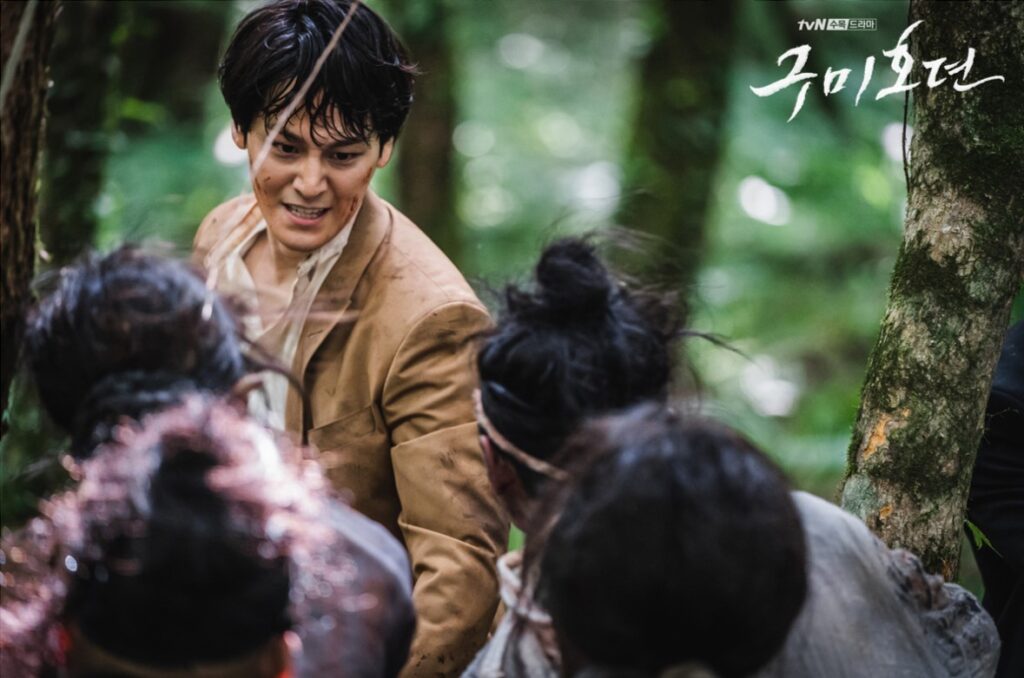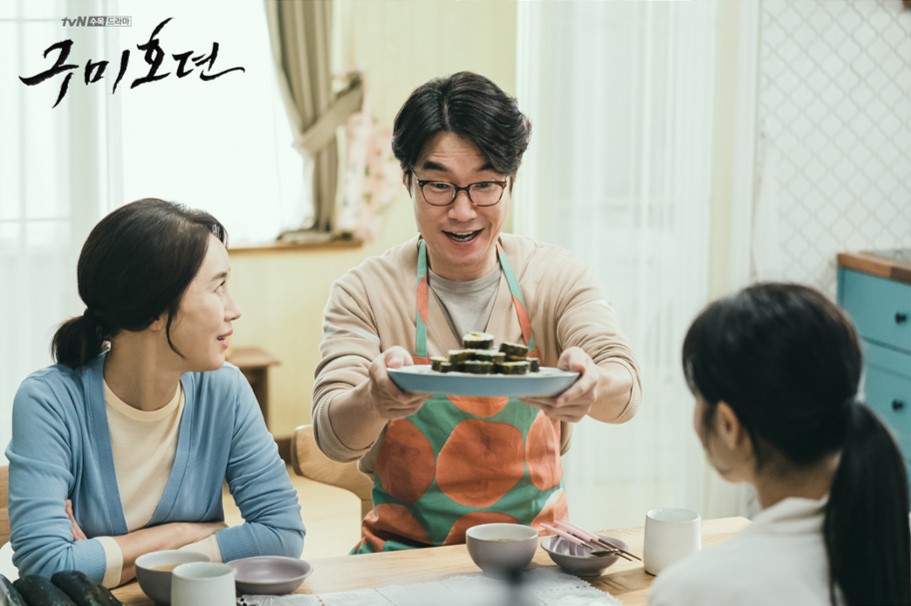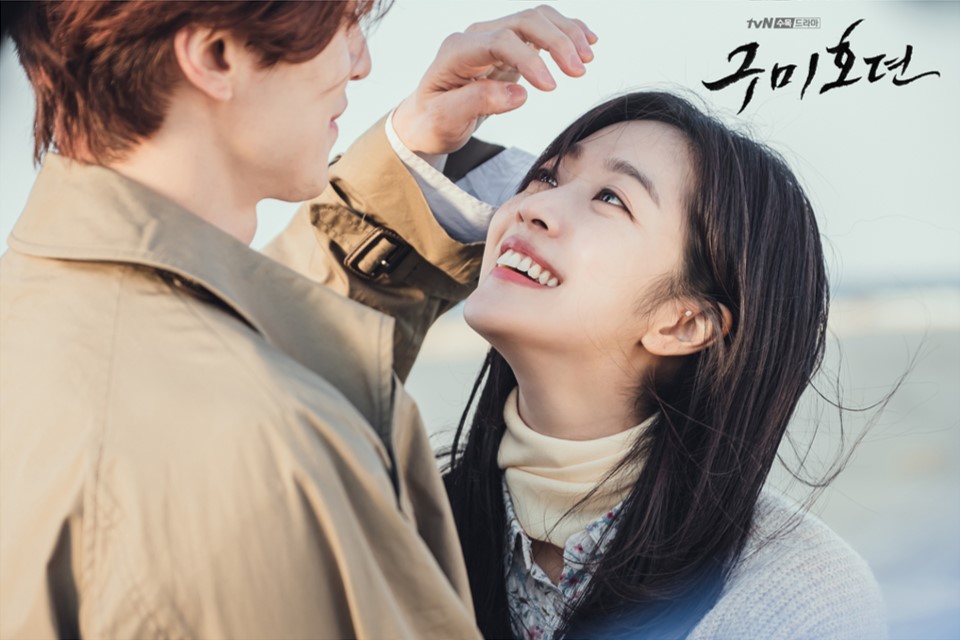
The first half of Tale of the Nine-Tailed (Nine-Tailed) introduced viewers to a spectrum of loveable and wretched characters, ending with a cliffhanger by episode 8. With characters flitting between alliances and striving towards their own goals, the tension spikes and viewers are in for a rollercoaster ride of thrills and trickeries. As the drama trudges towards its conclusion, the characters are pushed into increasingly dangerous situations and are forced into deciding who or what they treasure most in a world coming to be plagued by evil.
This review contains spoilers.
The drama review of the first eight episodes leaves viewers with the question as to whether vicious characters like Lee Rang (Kim Bum), Lee Yeon’ (Lee Dong-wook) younger brother, and Ki Yu-ri (Kim Young-ji), can in fact be brought back to the side of good. The answer is yes, as the rest of the drama reveals, through a reveal of their motivations behind their actions. Neither Lee Rang or Yu-ri become less brutal in their decision-making or in a fight. Rather, the audience is now privy into their allegiances which fuel their seemingly dubious alliances with the evil beast, Imoogi (Lee Tae-ri). Lee Rang’s love for Lee Yeon and desire to save his brother leads him to return to Imoogi for deal after deal which might threaten his own life, and Yu-ri bows down to Imoogi in exchange for saving Lee Rang, her saviour. None of them are malevolent like the way Imoogi is, merely pursuing different ends.
The result of having more good guys with a bunch of varying goals, in addition to wanting to defeat Imoogi, makes for an even more exciting plot progression. In this fight amongst the good guys in trying to save each other’s lives, the drama’s final climax to defeat Imoogi becomes a race of personal priorities. Lee Yeon is willing to lay his life down to save his lover, Nam Ji-ah/A-eum (Jo Bo-ah) and Lee Rang; Ji-ah and Lee Rang both want to save Lee Yeon; Yu-ri wants to save Lee Rang, and so on. Not a single plan can be taken for granted or at face value as characters carry out their own agendas behind the backs of each other, making the final battle a worthwhile watch even as it stretches over a good eight episodes.
The plot does really well in sustaining itself, despite only having one major villain, and the show determinedly refuses to fall into the typical frame of having the main protagonist deal one swift blow to end all evil. Plans get thwarted and reformulated, with twists and turns in the story that do not feel redundant or dreary. Arguably, having Ji-ah bear a significant portion of Imoogi from early in the series, and having its power slowly grow was a clever construction, giving her enough mobility towards the end of the drama to thwart Lee Yeon’s plans and constantly bring new threats onto the table.
It is also extremely pleasing to find that Ji-ah is not just another weakling waiting to be saved, making her struggle with Imoogi ever more intriguing. She resists it and negotiates with it on her own terms, making her just as independent in the fight against evil up to the very end. Nine-Tailed began with Ji-ah being a strong-willed and capable female character, which can be typical for many Korean dramas, but it is far more rare for dramas to keep this consistency in personality even when the supposed knight in shining armour appears.
This particular drama does stunningly in preserving Ji-ah’s intelligence and shapes her into Lee Yeon’s worthy comrade. She stands by him as they speak to Granny/Gatekeeper of the Samdo River (Kim Jung-nan) about finding a way to kill Imoogi, she steels herself to sacrifice her own life to save Lee Yeon’s without his knowledge, and she certainly escapes from the trickeries of numerous monsters with her own wits. It is also great to see how Lee Yeon avoids babying Ji-ah and believes in her capability to resolve her own problems when it is within her human abilities.
The drama, however, does fall slightly flat with its final episode, once the grand battle with Imoogi is over. After all the fuss about saving each other’s lives, Lee Yeon is the one to take the fall and the drama enters its bittersweet happily ever after last episode. Ji-ah, being a television producer, begins recording video logs of people around Lee Yeon in the hopes of him returning someday, somehow; Granny pleads with the Lord of the Underworld to find a way for Lee Yeon to return from the Underworld; Yu-ri gets married to Gu Shin-ju (Hwang Hee) and they form a family with Lee Rang and the young boy he had taken in.
All these seem kind of meandering, until the Fortune Teller/Judge of the Underworld (Lim Ki-hong) appears just so by chance and offers Lee Rang and Ji-ah a deal to save Lee Yeon — either one of them has to give up something precious to them, which he states would be their own lives Lee Yeon saved. Of course, Ji-ah wants to do it, but Lee Rang is the one who ends up trading in his own life. Lee Yeon returns as a human and viewers get a happy reunion. The show even offers up a scene of Lee Yeon crossing paths with a young boy who reminds him of Lee Rang’s younger self.
With the dynamism of the story till its spectacular showdown, having such an ending to tie up the loose ends is not particularly bad. It is certainly pleasant to see the main protagonists have their wish of growing old together fulfilled, though it certainly lacks the emotional thugs the series offered this far. Perhaps I’m asking too much, but for a show that has repeatedly emphasised missed chances in reincarnations beyond one’s lifetimes and the irreversibility of lives lost, its conclusion remains too fixated on trying to save everyone and their relationships. There is even an after credits scene showing Lee Yeon with his supernatural powers once again, a lead into the upcoming spin-off. Surviving seems way too easy now that the greater evil has been vanquished, and the ending dashed straight for idealistic, as most fantasy dramas would.
The show does enough merit in its plot trajectory and spectrum of characters that a so-so ending cannot entirely overshadow it. Yet, I do begrudge it a little for choosing the easy way out in its conclusion, instead of trusting its audience to engage with a more emotionally demanding and possibly more heartbreaking ending. I certainly wanted an ending that was less fairytale-esque, and even with its great storytelling up to the climax, I am left wondering if it would be better to let the dead remain as they are.
(YouTube. Images via tvN)




